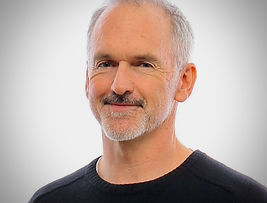Redirecting.work
David Gabriel
From Corporate Hustle to Rural Life and Coaching
David Gabriel is a longtime colleague whom I met through our volunteer work with IHRIM on its stellar magazine. We both loved writing, editing and discussing the intricacies of change management as applied to HR technology and talent management. Over the years we even toyed with the idea of collaborating on some projects, but while I’m a researcher, David is a change management and OD practitioner. We also share a mutual appreciation for craft brews, which has fueled many of our conversations.

The Catalyst for Change
David’s life has been marked by several pivots, often driven by a mix of professional and personal motivations. A significant shift came after McKesson’s CHRO asked him to relocate from San Francisco headquarters to Houston, Texas to build the company’s first specialty health organization. Having spent more than two decades living in SF, the move to The Woodlands proved challenging–culturally, education-wise and politically. After successfully integrating the acquired businesses and divergent cultures, David negotiated a strong severance and relocation back to the Bay Area. This allowed him to stay married ;) and his boys to matriculate from Berkeley High. Upon returning, David co-created a consulting practice, Global Reach Leadership, and worked on a number of enterprise transformation projects with startups and established businesses.
Having sold the craftsman home they built as a condition of the Texas move, the Gabriels rented when they moved back in the East Bay while house prices continued to skyrocket and despite making several offers but being outbid. Sons Noah and Aidan ultimately finished school and headed off to college.
One evening while perusing real estate listings David saw a 40-acre property in central Vermont—complete with solar panels, a carriage barn featured in Vermont Living Magazine, crystalline brooks, pond cottage and 1832 house [for less than half the money of a fixer in Berkeley]. With his wife’s blessing, an offer was made, accepted, and two months later these “reverse pioneers” were driving Penske’s biggest truck across the country with Izzie, their golden retriever riding shotgun.
While the move to a rural town of 1200 citizens has not been without its challenges, it’s allowed them to build a new community while hardening preparedness skills semi-remote northern New England living demands. David has learned how to drop trees where wanted and split wood; tune chainsaws, a snowblower and ATV; and mend electric fences for summer camper heifers. He feels a deep connection to the surrounding woods, rivers and mountains. In a sense, moving to Vermont is the realization of his love of hiking, skiing and camping—since he can now do all those just by stepping out the back door.
A New Direction: Executive Coaching with Purpose
David’s new professional direction is centered on formalizing his commitment to executive leadership coaching. He’s leveraging his extensive experience in corporate leadership development and doctorate in Organization and Leadership to help grow more connected leaders, teams and organizations. His coaching focuses on identifying specific tangible outcomes, creating space for transformation and enabling clients to tap into their innate strengths in order to transcend what’s holding them back personally and professionally as leaders and with their teams.
David’s mission is evolving, but it is deeply rooted in his desire to work with people who are driven to leave the world a better place. He’s particularly interested in helping leaders connect with their purpose and the impact they can make in their organizations and communities.
Advice for Successfully Pivoting
David’s journey offers valuable insights for anyone looking to pivot their career or life direction:
1. Embrace Your Passions and Identity: David’s move to Vermont and transition to rural living reflect his belief in the importance of community and sustainable connection to nature. Whether it’s a geographic location or a new role, find a space where you feel truly connected and grounded.
2. Formalize Your Skills: After years of doing informal coaching within corporations, David took the step to formalize his skills through ICF coaching programs and certification. His advice: if you’re passionate about something, invest in it, formalize it, and make it a part of your new direction.
3. Be Financially Stable: David emphasizes the importance of financial stability when making a major life pivot. Leveraging a steady job and income provided the financial padding needed to take the risk of a cross-country move. Of course, it’s also helpful to know how to work and impact drill and skill saw since there is always maintenance and renovation to do on a country compound.
4. Acknowledge the Challenges of Moving: Moving, whether it’s to a new city, a new home, or a new career, can represent significant change and transition. David’s journey is providing an opportunity to be more present with others, including his wife of 30+ years, but has also brought its share of challenges.
5. Keep Evolving: David continues to learn and evolve as he seeks to make a difference through coaching and work. His advice: stay curious, stay organized, and keep pushing forward.
Conclusion
David Gabriel’s story is one of ongoing evolution, from city to country life, and from corporate Leadership and OD leader to purpose-driven coach. His journey highlights the importance of staying true to your passions, investing in your skills, and ensuring financial stability before making significant changes. By embracing these principles, David has crafted a life that is both fulfilling and impactful, proving that it’s never too late to pivot toward a new direction that aligns with your values and aspirations.